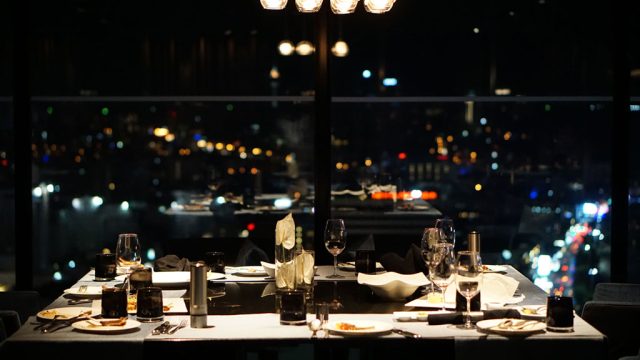
If you want to discover great eating, if you want to thoroughly enjoy fine dining, our advice to you is this: Don't try too hard. Cooking professionally is primarily a dominant act. Preparing food, supervising cooks, maintaining costs, and ensuring consistency are all about control. Eating well, by contrast, should be submissive. You make the important decision about where to eat and when, and then relax and allow the experience to wash over you. If you have a reasonable expectation that the cooks or the chef know what the hell they're doing, this should be enough to suspend your overt critical faculties. No more monitoring the progress of busboys, no listening for the bell calling the waiters, no analyzing sauce reduction. Your only concern should be, Does it taste good. You can dissect the meal later-over a digestif, perhaps, or the next day. For now, let's eat. But you can tip the scales in your favor if you keep a few simple pointers in mind. And for more advice on how to go out to fancy restaurants like a seasoned veteran, read about The 7 Biggest Mistakes You're Making at Fine-Dining Restaurants.
1
Follow The Crowd.

On the low end, meaning a late-night hot-dog joint like Ben's Chili Bowl in Washington, D.C., a bun cha restaurant in Hanoi, or an oyster bar like Swan's Oyster Depot in San Francisco, you need only look around. Is the place packed with locals? Are they enjoying themselves? Even if the chili is being ladled out of a well-crusted steam-table crock, what's the worst that could happen? A little extra time on the thunder bucket tomorrow? Surely a fair trade for a delicious and classic experience. Do you really need to know the provenance of the oyster in Swan's chowder? Nah. Instead, find out what everyone is eating, and concern yourself with how much longer your wait is. And while the walls and floor of the bun cha place may be caked with soot from the coal-fired grill, keep in mind the wisdom of a character from Idwal Jones' High Bonnet: "A little honest dirt is seldom an impediment to a great meal." If a business occassion has you seeking out a great restaurant, be sure to check out this video.
2
Look For Proud Waiters.

You can often tell a good restaurant by the demeanor of its wait staff. Proud waiters—guys who look as if they're onto a good thing, making money, and who seem unconcerned whether "everything is all right" and maybe even appear aloof or rude-can be a sign of an excellent eatery, especially at a reputable deli or Chinese restaurant. In general, waiters want you to like your meal. They will rarely, despite the urgings of the kitchen, encourage you to order something they don't think you'll appreciate. They want you to enjoy the food and have fun. They want you to leave a big tip.
Steer clear of oppressive fine dining rooms. On the flip side, if the waiters are too serious, the dinner too formal, and you feel like a Beverly Hillbilly for putting your elbows on the table and mopping sauce with your bread, you're not going to enjoy the meal no matter how good the food is. That's joyless eating. To help narrow down your search for a great restaurant, check out the 50 Best Steakhouses in America.
3
Embrace Small Menus.

Small menus centered on one region or style of cooking are—let us hope—a sign that the chef knows where he comes from and what he's good at, and is expressing that pride and familiarity through his food. A highly focused menu of just a few entrées suggests that the chef is confident in his ability. He's not trying to be all things to all people (something he'll inevitably fail at). Despite my past and overly hyped warnings about mussels, a busy Belgian-themed restaurant with a small menu on which mussels are heavily represented probably has pretty damned good mussels. The ridiculously busy steak house with two things on the menu-steak and steak-likely serves a pretty decent slab of meat. The half-empty cafe/saloon/restaurant/lounge with a vast menu listing chicken teriyaki, goat-cheese ravioli, tuna tartare, and fajita wraps is, however, not the best option for anything. Such insecurity about identity, such lack of focus and specialization in a moderately priced restaurant, is often a big warning sign.
4
Don't micromanage the meal.

You may ordinarily prefer steak to fish, but should you find yourself at New York City's renowned fine dining mecca Le Bernardin and you notice the lone meat dish is relegated to the tiny fish-free ghetto at the bottom of the menu, pay attention. While the steak is unquestionably of high quality, it is now clear-even if you didn't know already-that this restaurant is all about fish. Order fish.
By the same token, you'd be out of your skull going to New York's Per Se with, say, pork chops in mind. You go to Per Se to find out what Thomas Keller and his talented lieutenants are up to. You don't go to a topflight sushi bar like Yasuda in New York for the California roll and maybe a few pieces of tuna. You sit your ass down, order some sake, say, "Omakase" (Japanese for "you decide," meaning it's up to the chef to determine what you'll eat), and ride what will undoubtedly be a wave of delightful surprises. Whatever you might have read or heard about Charlie Trotter or Tetsuya Wakuda or Gordon Ramsay, don't go into their restaurants with preconceived notions. Instead, lay back. Put yourself in their hands and find out what they have. If you are not inclined to go for a full-bore tasting menu, inform your waiter of any food allergies or deeply held aversions you may have, ask for suggestions, and go with it. For help on choosing what to order at a great restaurant, here are 25 Foods That'll Keep You Young Forever.
5
Don't Try And Customize Your Order.

Another foolish (and insulting to chefs) move by diners is when they build their own dishes out of spare parts: "I'll have the tuna but with the sauce from the salmon, and could I substitute the Swiss chard from the venison for my braised fennel?" You think I'm exaggerating? Ha! A lot of idiots and Hollywood actors on drugs-who are unlikely to actually eat anyway-go to restaurants and act this way. I want to say to them, "Who's the chef, anyway? You? Then cook the damn food yourself, wise guy."
In the end, it's only food. A mediocre grilled-cheese sandwich can be a sublime thing when the jukebox against the wall is cranking out one great blues song after another and the beer is properly poured. A simple duck confit can remain a memory forever if there are pigs and chickens running between your legs while you are savoring it, and a pricey 4-hour degustation (tasting menu) can taste a lot better if the chef pulls his head out from between his cheeks, dispenses with the "water sommelier," instructs his floor staff to "lighten up," and allows you to enjoy. You can't plan for great dinners. You can't go searching for the perfect meal with any kind of an expectation that you'll find it. You put yourself in the position to have the perfect meal happen. It's going to happen.





















